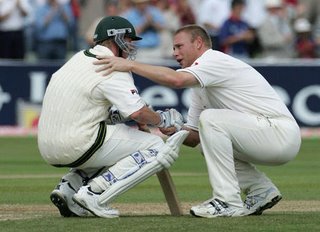One Day We Will Lose
The Dug Out
Why do you lie with your legs ungainly huddled,
And one arm bent across your sullen, cold,
Exhausted face? It hurts my heart to watch you,
Deep-shadow’d from the candle’s guttering gold;
And you wonder why I shake you by the shoulder;
Drowsy, you mumble and sigh and turn your head …..
You are too young to fall asleep for ever;
And when you sleep you remind me of the dead.
Siegfried Sassoon. St Venant, July 1918
It touches me as much as it did then, nearly forty years ago, when I first studied it for O-level. Two years ago I attended the Armistice Remembrance Parade and service in Bakewell.
11th November 2004
It’s Sunday morning, just beyond early light,
the first frost sharp throughout, enough
to strip each branch of their legion colours.
The sun shines low, a single clear signal
to head a day of remembrance
as Bakewell readies itself to remember.
The town marks time in its market square;
shops, pubs, cars, ourselves near enough still
as gravestones
till we leave.
Those with most to remember or forget
let us follow, in train, behind the lines.
Young lads in uniform, not quite in
or out of step. Their pudding girls grin
at the parlour door, full lace prinnies
ironed starched white, almost waving them off
lest they forget.
The bugler calls,
so we march, and march; sing and sing.
Commands barked against cold bare skin
wreathed more than breathing a long held silence.
Names read out
Their letters addressed in order of dispatch,
the last post and final delivery
They did not rush to catch.
Did it matter if the sun shone
when they went over the top?
Earlier this year I met with Mark O’Connor, a fine Australian poet who took part in the Sydney Olympics – not running a sub-four minute sonnet, Mark was the Olympic poet, reviving a tradition where the muse was part of the ancient games but lost till 2000. Here is an Australian view of 1914-18.
Pozieres Cemetery (WW1 France)
- Our fathers: did they dream as yabbying boys
on their farms in Deniliquin, Horsham, Scotshead, Yass,
of so deep a subsoil waiting for their bones?
. . . Instead two old men hobble down the rows
dreaming of young men whom they knew; while honour and folly
hold the ground under the gently piddling skies of France.
Written on The Somme, 1977 Mark O’Connor
What’s this to do with cricket? Had the French and Germans taken the game at all seriously would it have prevented 1870, 1914-18, 1939-45? Difficult to prove, or disprove.
In all seriousness by the time you read this I’ll probably be wearing a t-shirt inscribed ‘I speak of bats, balls & wickets’ at an Australian Test Match not near you in homage to Virgil's kick-off line to his classical epic the Aeneid. It’s a way of telling people who I am and what I’m doing. The uniform of an Ashes poet in residence, in the same way cricketers wear whites, stewards florescent jackets or Tommies' khaki battledress.

I’m not saying Freddie Flintoff and the Barmy Army would’ve finished off the Trojan wars inside three days, nor that injury-struck England on current form could do with Hector, Ajax, Achilles and Agamemnon on their side. More that cricket isn’t war. George Orwell said ‘sport is war without weapons’ perhaps because as Eric Blair he won a scholarship to Eton, with its regime of rugger, cold showers and the Eton Wall game – where the cream of the upper classes run straight into a brick wall. Deuced good practice for going over the top and running straight into a hail of machine gun bullets. You need leaders in those situations.
Jardine went to Eton. If sport is war without weapons, I think war is sport without love. Douglas Jardine led England on their notorious bodyline series, where within the laws of the game England bowled straight at Australian batsmens’ hearts - literally. Justification came from the same logic as the carnage of the trenches: it lay within the rules of war. Officer and a gentleman, leader of men etc etc but no sense of feeling, not even animosity. World War One and The Ashes were just something to be won.
The abiding image of last year’s series is Flintoff consoling Bret Lee at Edgbaston after losing two runs short of an amazing victory which would’ve all but kept the Ashes with Australia.

Sport is war with love because winning isn’t everything.
Who do you reckon will win? People ask me as though I might know. Don’t see how. I’m a poet, not a cricket correspondent, yet they do. And more interestingly they say ‘Don’t come back without the Ashes.' It means a lot to a great deal of people. Probably far more than poetry.
Their Premier’s XI stuffed us in Canberra, watched by Mark O’Connor amongst others. ‘Yes, I was there,’ he said, not needing to say more. Some would say that Howard’s selection for the PM's XI is the best thing he’s ever done for the country. Could Graveney and Fletcher do worse than Brown and Blair? I couldn’t possibly comment, but note in the traditional equivalent fixture in England, the Australians play the Duke of Norfolk’s XI at Arundel (don’t ask why it’s Norfolk in Sussex.) Class, gentlemen and players, hearts of old England, play up, play the game. Yeoman stock Kevin Pietersen might reflect on duty and Sassoon to cut out the hook shot, but the signs are England have ferried their half-day international form from India to Australia.
One day we will lose. At least we’re consistent and consistency is everything, like they say about custard.

<< Home